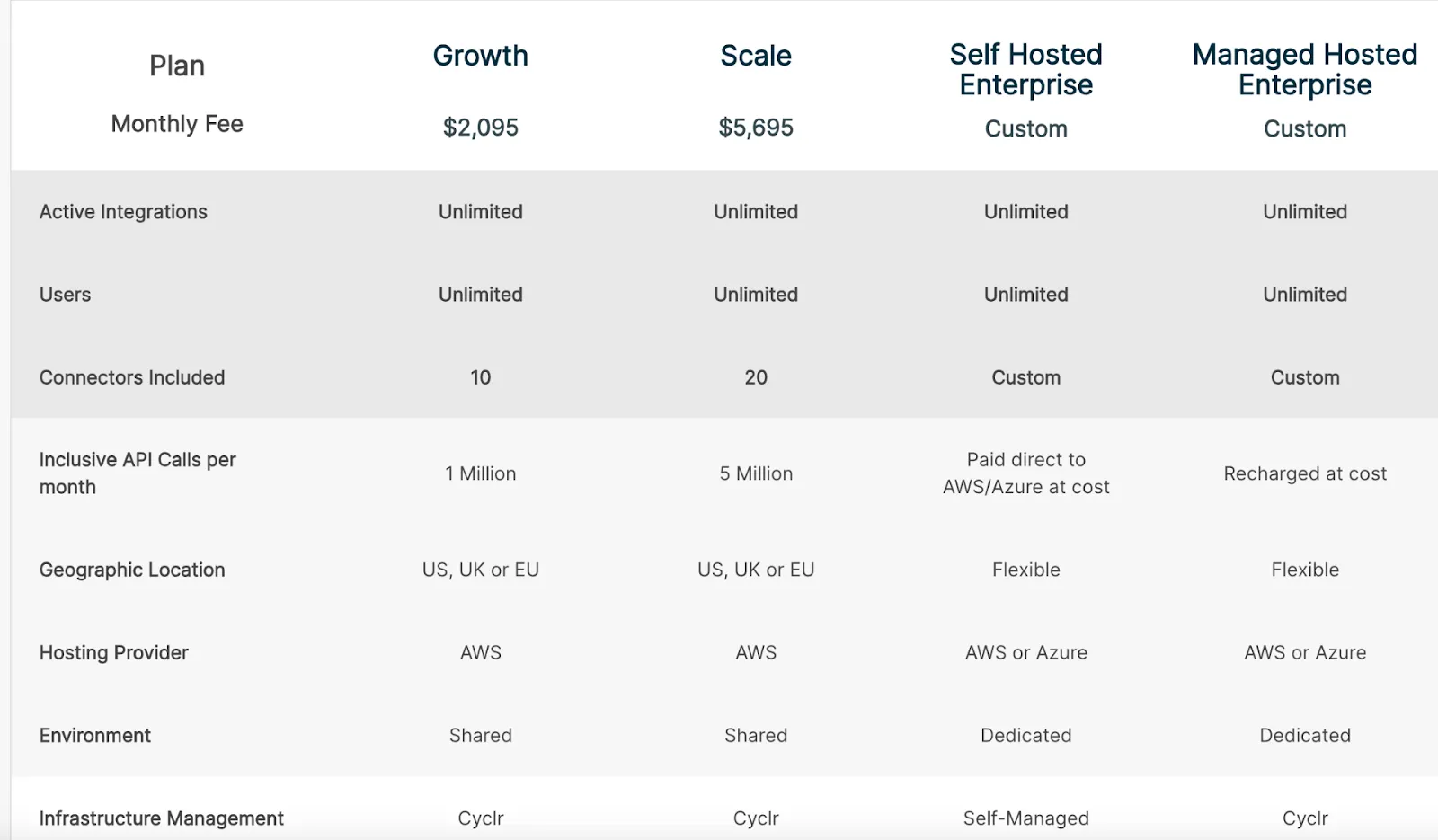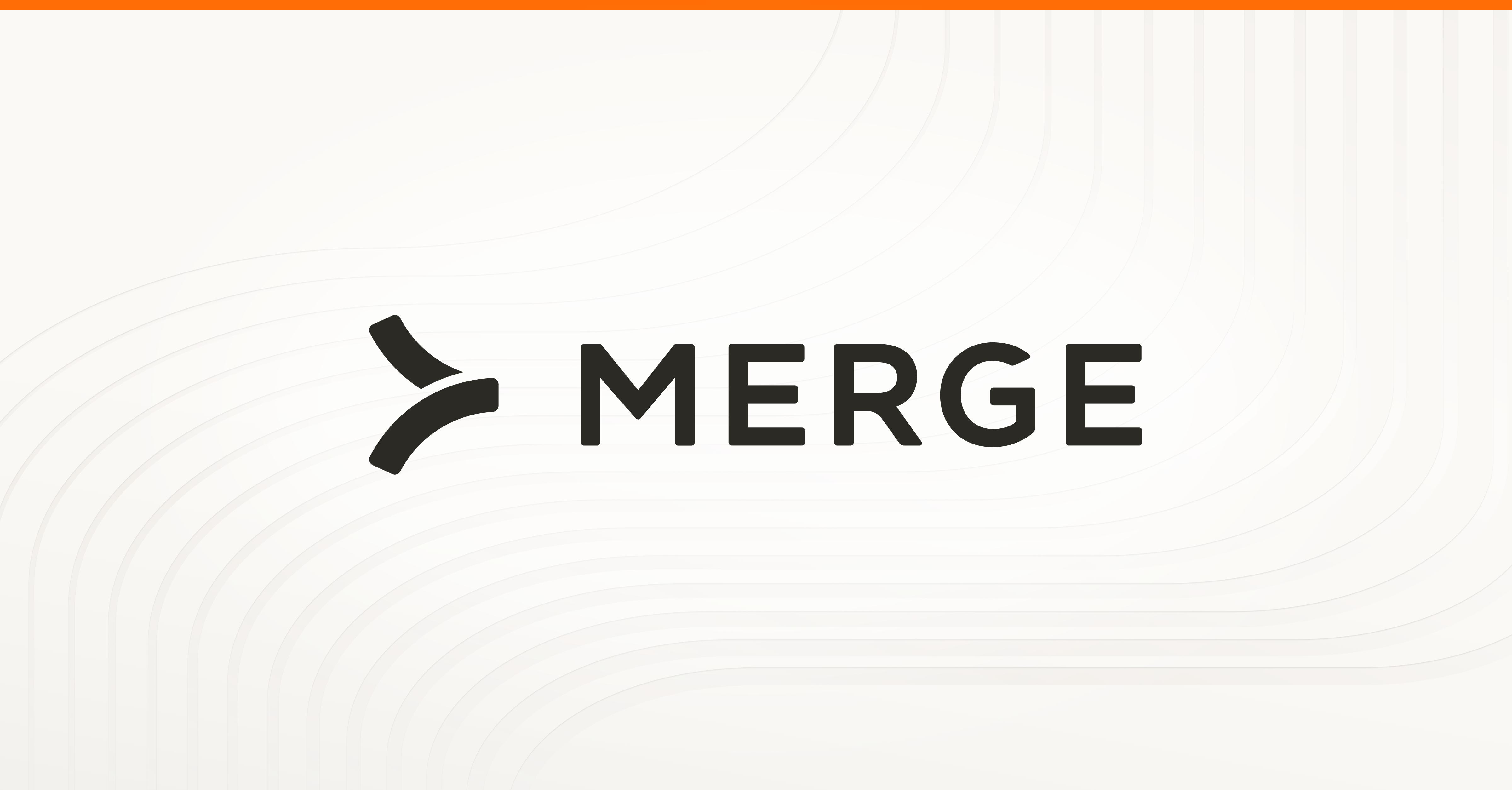Table of contents
iPaaS costs: how popular vendors price their platforms

As you look to invest in either a traditional or embedded integration platform as a service (iPaaS), you’ll need to evaluate the pricing models of various vendors comprehensively.
After all, making the wrong decision can have a profound impact on your organization’s ability to scale your integrations effectively.
Few iPaaS vendors provide specific price points publicly; they usually require you to speak to their sales reps before giving you a clear picture of their costs. However, you can get useful, high-level context on the cost of using any solution by reviewing the pricing model laid out on their site.
We’ve done just that for a few popular iPaaS and embedded iPaaS solutions to help accelerate your evaluations.
Note: The information presented below is accurate as of 10/14/2024.
Workato
Workato, which offers both an iPaaS and an embedded iPaaS, provides specific pricing models for each offering.
In the case of their iPaaS, you’ll get access to a workspace where you can get an unlimited number of connectors, add unlimited users, and build endless automations—or so it seems. The number of tasks (which Workato describes as “a unit of work done by Workato on behalf of customers”) you need is ultimately where their variable pricing comes into play.

You’ll need to speak with a rep from the company to learn how their task-based pricing works, but you can assume that since any recipe consumes one, if not multiple, tasks, your integrations and recipes won’t be unlimited.
In the case of Workato’s embedded offering, there’s also little in the way of specifics. You’ll get “Access to 24x7 support”, but there’s no mention of the support channels they’ll provide and if there are any days where support isn’t available.
There’s also no mention of the costs of add-ons. For example, it doesn’t cover whether whitelabeling the solution would come at an additional cost or if allowing customers to implement integrations and automations themselves (versus solely having your team build and maintain them) would be an additional expense.

Finally, Workato provides “Onboarding packages” for both solutions, but there’s no mention of what’s included in the packages.

Related: How embedded iPaaS solutions compare with traditional iPaaS tools
Cyclr
The embedded iPaaS provides significantly more transparency in their pricing.
They charge a flat monthly fee across their plans. Moreover, they allow you to add an unlimited number of users onto the platform. And every plan comes with a specific set of features and functionality, like an embedded marketplace, a workflow builder, and synchronous webhooks.

That said, they restrict the number of connectors you can access based on their plan. The plan you're on will also determine the number of API calls you can make through the platform every month.
You can always add more connectors ($80 per connector every month) and tack on additional API calls, but they come at an additional monthly cost of $80 (per connector) and $210 (per 200,000 API calls), respectively.
It’s also worth noting that Cyclr charges $6,000 for their “Onboarding Fee” and you’ll only get account management support starting at their “Scale” plan.
Mulesoft
Mulesoft, a widely-used iPaaS that was acquired by Salesforce, offers two plans: Anypoint Integration Starter and Anypoint Integration Advanced.

Both plans allow you to access an unlimited number of pre-built API connectors. This makes the prospect of scaling your integration builds relatively cost-effective.
However, it’s only through their more advanced plan that you can access additional features and capabilities that are necessary for monitoring and analyzing the health of your integrations. For example, you can only access their alerting and log management functionality and the ability to build custom dashboards via their advanced plan.
Through either plan, you’ll also get support via their “Premier Success Plan”; alternatively, you can upgrade your support plan by adopting their “Signature Success Plan,” which will let you work with a customer success manager, get faster response times to significant issues, and more.

Related: How to price product integrations
Access transparent and cost-effective pricing with Merge
Merge—the leading unified API solution for adding customer-facing integrations—offers transparent pricing across each plan (Launch, Professional, and Enterprise). This includes everything from the syncing features to the Integration Observability tooling to the developer tools to the level of support you’ll get access to.

You can also validate your use cases with the platform quickly, easily, and independently via the Launch plan.
Learn more about Merge’s pricing by scheduling a demo with one of our integration experts.
iPaaS costs FAQ
In case you have any more questions around how iPaaS solutions are priced, we've answered several commonly-asked questions below.
What is the average cost of an iPaaS?
The average cost varies widely, as it depends on the number of integrations you need to add, the volume of API calls you need to make, the level of support your team needs, and more. That said, you can expect to pay at least $30k per year.
What is the iPaaS pricing model?
iPaaS solutions generally offer different plans that vary by usage (i.e., volume of connectors and API calls), level of support, and performance (e.g., maximum poll frequency).
To better understand the pricing model of any solution, you’ll need to visit their site and/or talk to someone on their team.
What’s the best iPaaS?
The best iPaaS largely depends on your integration requirements. That said, based on 3rd-party analyst reviews and customer feedback on sites like G2, the best solutions are Workato, Mulesoft, Boomi, and Informatica.
How do you evaluate iPaaS solutions?
To evaluate any solution successfully, you’ll need to review their online reputation, test the product through a proof of concept, review relevant case studies, and more.






.png)

.jpg)

